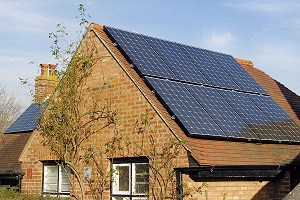 An energy efficient home is good for the planet and your bank account. ENERGY STAR says that energy efficient home improvements could cut your utility bill by as much as 20%. That’s a huge savings, and it’s one you can feel good about.
An energy efficient home is good for the planet and your bank account. ENERGY STAR says that energy efficient home improvements could cut your utility bill by as much as 20%. That’s a huge savings, and it’s one you can feel good about.
If you’re shopping for a new house, it’s the perfect opportunity to make sure you’re getting the most energy efficient features possible.
Energy-Efficient Insulation
If you’ve ever lived in a house with a drafty doors and windows, you understand the importance of good insulation. It’s not just about comfort – although that is important. It’s also about energy efficiency. Poor insulation makes it more difficult to maintain the right temperature in your home, resulting in higher cooling costs in the summer and high heating costs in the winter.
When assessing the insulation of a home, there’s a lot to consider, including the type of material, the thickness, and how it’s installed. The R-value will tell you whether your insulating material is highly resistant to conductive heat flow. A higher R-value means the material is a more effective insulator.
The Department of Energy says that the R-value you need will depend on a few factors, including where you live, the part of the house you’re trying to insulate, and the type of heating and cooling system you’re using.
Energy Efficient Appliances
Appliances can use a lot of energy, so going with energy efficient options is important. This is especially true for HVAC systems.
According to ENERGY STAR, as much as half of the energy used in your home could go to heating and cooling. This makes having an energy efficient HVAC system important for both your comfort and your wallet.
Smart Home Systems
Smart home features make it easy to control different aspects of your home – like the security system or lights – from your phone. A smart thermostat is great way to control the temperature when you’re home or away for maximum energy efficiency.
But one word of advice – if you buy a home with a smart thermostat, make sure you take over the controls from the previous owner. Otherwise, you might find the thermostat going on and off based on the previous owner’s preferences instead of your own.
“Look up the model and perform a factory reset,” says Jan Green, REALTOR®, GREEN, SFR, EcoBroker®, in a blog on ActiveRain. “You’ll have to set up your own preferences and passwords, but at least you’ll learn the system now that you own the home.”
Solar Panels
Instead of simply using energy efficiently, why not generate your own energy using solar panels? This can be a great way to reduce your electricity bill.
When purchasing a home with solar panels, it’s important to pay attention to whether they’re owned or leased. If they’re leased, you may be responsible for taking over the payments, and this might not be cheap.
The Right Real Estate Agent
There’s a lot to keep track of when buying an energy efficient home, and new advancements in technology mean the details are always changing. Energy efficient features can also have a complicated impact on the home’s value.
If you’re interested in buying an energy efficient home, make sure you work with a real estate agent who is knowledgeable in the area.
Protect Your Move
Are you ready to move into your new energy efficient home? Don’t forget to protect your move with moving insurance.
